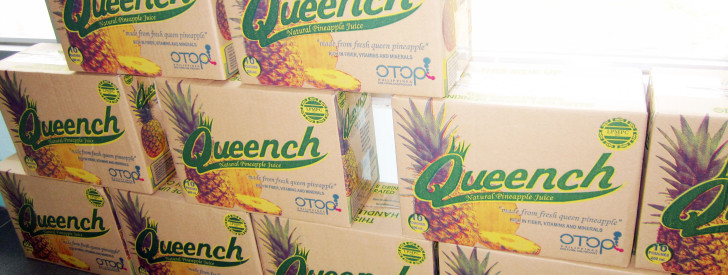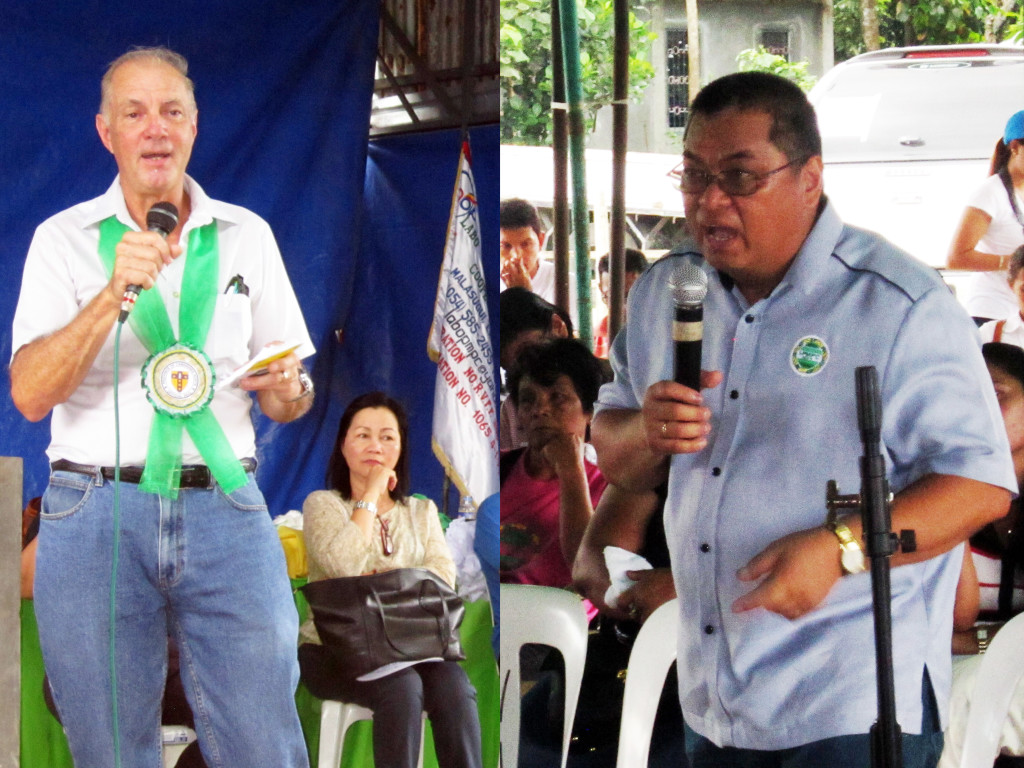 QUEENCH. The Labo Progressive Multi-Purpose Cooperative takes its Queen pineapple production to another level through the “Camarines Norte Pineapple Trading and Processing Project” that will be funded by PRDP. (Photo by Gumamela Celes Bejarin, DA-PRDP PSO South Luzon InfoACE Unit)
QUEENCH. The Labo Progressive Multi-Purpose Cooperative takes its Queen pineapple production to another level through the “Camarines Norte Pineapple Trading and Processing Project” that will be funded by PRDP. (Photo by Gumamela Celes Bejarin, DA-PRDP PSO South Luzon InfoACE Unit) Cam Norte’s Queen Pineapple takes the PRDP Spotlight
The famous “Queen” or Formosa pineapple of Camarines Norte gained another recognition not only because of its very sweet fruit. This time, the Queen pineapple took the attention of PRDP, because of its ability to provide livelihood opportunities and higher income for the people of Labo in Camarines Norte.
One of PRDP’s proponent groups for the I-REAP or enterprise development component, the Labo Progressive Multi-Purpose Cooperative (LPMPC), took pride of its “Camarines Norte Pineapple Trading and Processing Project” that was featured during the World Bank’s 2nd Implementation Support Mission to the South Luzon cluster.
LPMPC general manager, Mario Espeso, presented their cooperative’s business plan to the group composed of representatives from the World Bank team led by Douglas Forno, Institutional Specialist of the Food and Agriculture Organization, PRDP National Project Coordination Office, Project Support Office, Regional Project Coordination Office, the local government units of Labo and Camarines Norte, and residents in the community.
With a total project cost of P26,669,187.98, the Regional Project Advisory Board (RPAB)-approved enterprise development sub-project will proceed with the implementation in June 2016. The said project will benefit the cooperative’s 9,140 members, especially its current 55 pineapple grower- farmer members. It also aims to engage at least 170 grower-farmer members at the tenth year of the project implementation.
According to Espeso, LPMPC utilizes the usually disregarded and so-called batterball or small size pineapples that compose at least 30% of the farmers’ produce. He said that while the batterball pineapples are valued less in trading, they can be valuable in processing.
The sub-project scope includes sourcing supply of fresh queen pineapples from the farms of LPMPC members and non-members, buying the batterball or reject size pineapples from grower members, processing juice drinks and pure pineapple juice, and selling surplus fresh pineapple fruits.
LPMPC also took pride of its compliance to Good Agricultural Practices, Good Manufacturing Practices, Sanitary Standards Operating Procedure, and Hazard Analysis Critical Control Point for the cooperative’s pineapple production and processing that will later improve its productivity. The cooperative also offers “agri-loans” for the pineapple production of its members.
During the open forum, Douglas Forno of World Bank commented, “You don’t give somebody money without expecting something in return.” He then explained that World Bank, as the funding agency, would like to see that the project would benefit not only the proponent group, but also the greater number of people in the communities.

Douglas Forno, Institutional Specialist from the World Bank team (Left) and Mario Espeso, General Manager of the Labo Progressive Multi-Purpose Cooperative (Right) discuss their views on benefits of the enterprise development project to the pineapple industry in Labo, Camarines Norte. (Photo by Gumamela Celes Bejarin, DA-PRDP PSO South Luzon InfoACE Unit)
In a ten-year period, the Camarines Norte Queen Pineapple Trading and Processing Project aims to generate an average annual net income of P15,555,627.22 from the pineapple fruit trading and processing operations. The project also intends to increase the income of pineapple farmers by increasing the buying price per fruit, buying reject sizes, improving the volume of good size pineapples, offering financial and technical services, and following the Good Agricultural Practices.
Labo Mayor Joseph Ascutia said, “I hope that this project will develop the pineapple industry in our town.” For the project to succeed, Acting Camarines Norte Governor Jonah Pedro Pimentel encouraged the stakeholders to do their share.
Department of Agriculture Agribusiness and Marketing Assistance Service Director and NPCO I-REAP Component Head Bernadette San Juan stated that their team will do the final review of the LPMPC project for the immediate issuance of no objection letter and official start of the project implementation. ### (Gumamela Celes Bejarin, DA-PRDP PSO South Luzon InfoACE Unit)
